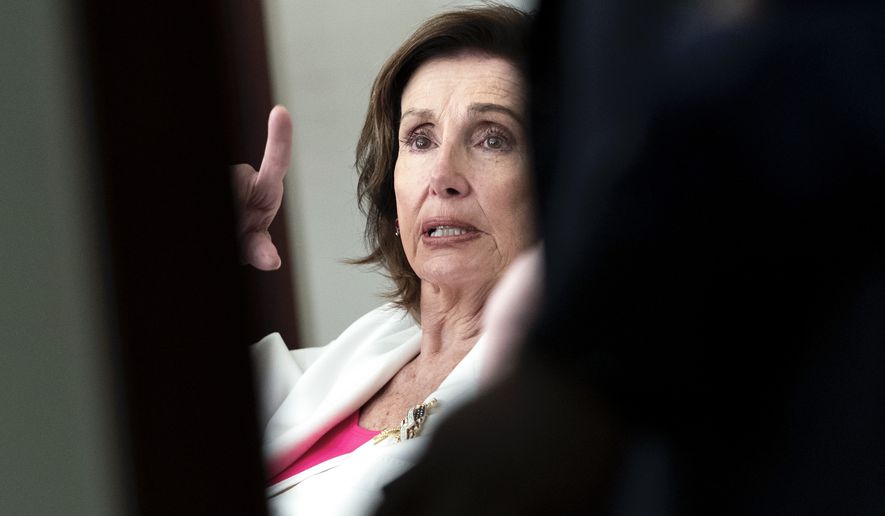Congressional Democrats are rushing to avert a government shutdown by the end of the week amid a pileup of legislative and fiscal deadlines.
Democratic leaders are poised to introduce a short-term funding bill on Tuesday to keep the government afloat past Dec. 3.
The measure will fund the government until mid-January at which point Democrats hope to strike a deal with Republicans on funding the government throughout the end of 2022.
“By the end of this week, both parties must come to an agreement for funding the government and avoiding a needless shutdown,” said Senate Majority Leader Charles E. Schumer, New York Democrat. “With so many critical issues, the last thing the American people need right now is a government shutdown, and Democrats are going to work this week to make sure we don’t have one this time around.”
House Speaker Nancy Pelosi, California Democrat, is expected to rush the stop-gap funding measure through her chamber as early as Wednesday.
Lawmakers from both sides of the aisle are pushing for the package to include increased funding for Afghan refugee resettlement and more military aid to Taiwan and Ukraine as they face provocation from Russia and China, respectively.
While Mrs. Pelosi is assured passage of the bill, it remains to be seen how many House Republicans will vote to avert a government shutdown.
Most GOP lawmakers say they are wary of shutting down the government ahead of the Christmas holiday, especially as a new strain of the coronavirus has emerged.
“There is absolutely no appetite for a government shutdown on either side,” said Rep. Chuck Fleischmann, Tennessee Republican.
There is a contingent of Republicans, however, that argue a vote for the short-gap funding measure will only embolden President Biden and Democrats to continue mismanaging the country’s affairs.
“The border crisis, the inflation crisis, the supply chain crisis and the government debt crisis—each of the crises facing our nation today can be traced back to specific policies pursued by Democrats,” said Rep. Jim Banks of Indiana, the chairman of the Republican Study Committee. “We can’t give Biden a green light to continue on this destructive path.”
Mr. Banks is urging his colleagues to vote against the short-term funding measure until the White House begins taking the crises facing the nation seriously.
“Republicans should stand up for working American families and oppose any funding bills that don’t include measures to reverse these man-made crises,” he said. “A vote on the continuing resolution is a vote for the Biden agenda.”
Despite the pushback from some Republicans, the bill is assured passage within the House, even if it moves strictly along party lines.
Within the Senate, the situation is different.
Given the chamber’s filibuster rules, the short-gap funding measure will need the support of at least 10 Republicans to pass.
Senate Majority Whip John Thune said bipartisan support existed for averting a government shutdown, but it would be contingent upon whether both sides could strike a deal on outstanding funding issues, like refugee resettlement.
“We’re probably looking at [keeping the government funding through] January-February,” said Mr. Thune, South Dakota Republican. “The question is what anomalies would [the bill] carry, there’s clearly no consensus.”
Complicating matters is that the Senate is bogged down by a series of looming legislative debates and fiscal deadlines.
Apart from funding for the government running out at the end of this week, the Senate will likely have to pass a debt-limit extension by Dec. 15.
Treasury Secretary Janet Yellen has warned that not doing so would risk the nation being unable to pay its debts.
Republicans have ruled out backing any further increases to the debt ceiling, arguing that Democrats should do it on their own via budget reconciliation.
The process, which Democrats are using to pass Mr. Biden’s mammoth social welfare bill, allows some tax and spending measures to avert the Senate’s 60-vote filibuster threshold and pass by a simple majority.
Mr. Schumer and Senate Minority Leader Mitch McConnell have held private talks on the issue, but no immediate resolution is in sight.
“We agreed to kind of keep talking, working together to try to get somewhere,” said Mr. McConnell, Kentucky Republican.
On top of the debt-ceiling and government-funding deadlines, Senate lawmakers are busy debating two pieces of legislation instrumental to Mr. Biden’s agenda.
The first is the annual National Defense Authorization Act (NDAA), a series of bills specifying the budget and policy priorities of the Department of Defense.
The NDAA passed the House earlier this year, but has languished within the Senate.
Despite the bill being broadly popular, it has hit an impasse within the Senate over a provision requiring women to register with the Selective Service for a potential draft.
Other outstanding issues preventing the bill from moving forward include repealing the Iraq war authorizations and U.S. policy stemming from the fall of Afghanistan.
Lawmakers initially hoped to pass the bill before adjourning for the Thanksgiving holiday, but those efforts were stymied. Mr. Schumer is pushing for the bill’s passage this week, but it remains to be seen whether he will succeed.
Democrats are similarly working to finalize Mr. Biden’s $2 trillion social welfare bill, named the Build Back Better Act. While the measure narrowly passed the House earlier this month it will require significant changes for all 50 Senate Democrats to get on board.
All of that has ensured the Senate calendar is packed with legislation, despite lawmakers only poised to be in session for three weeks before departing Washington for the Christmas holiday.
“As you know, the legislative agenda for the remainder of 2021 is considerable,” said Mr. Schumer. “I am confident we can get each of these important items done this year, but it will likely take some long nights and weekends.”
• Haris Alic can be reached at halic@washingtontimes.com.




Please read our comment policy before commenting.